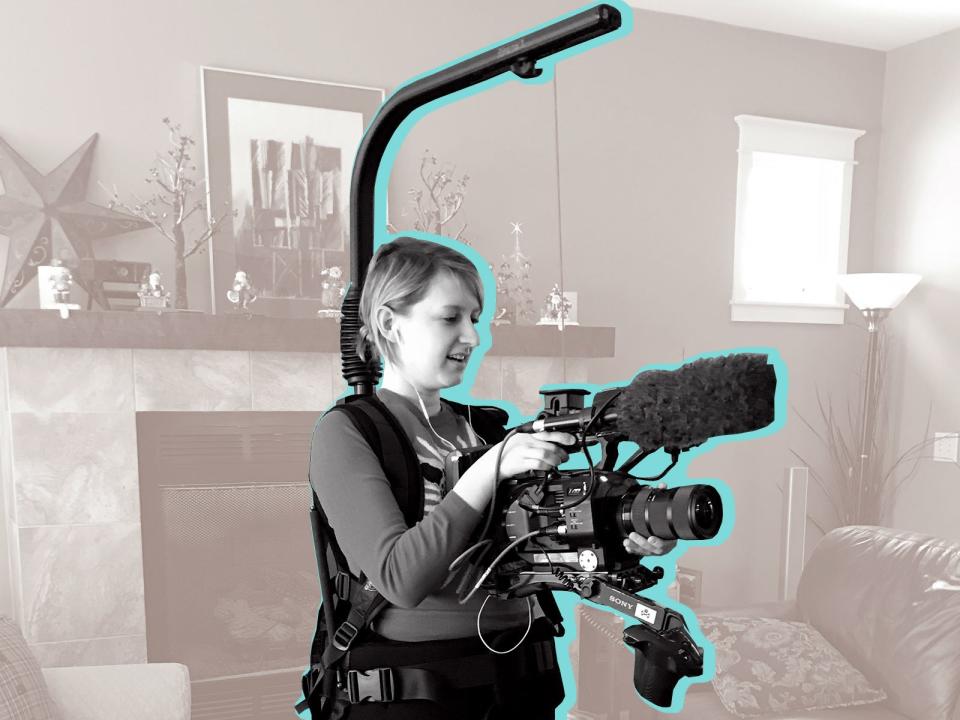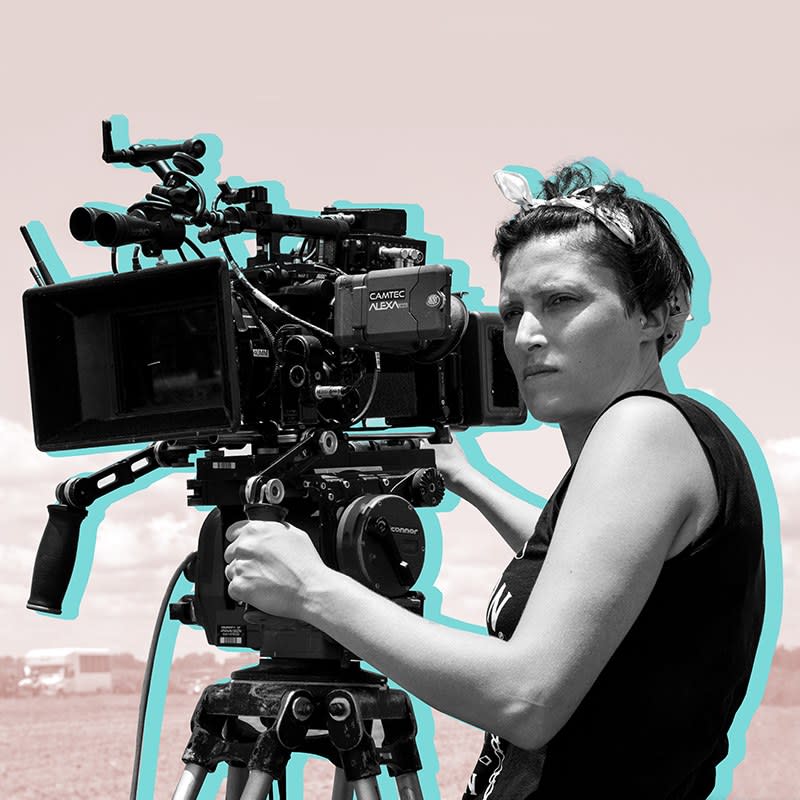This Is Why You Don’t See More Women Behind the Camera
On a 90-degree day in July, I was lugging a pelican case through a New York City park. Inside the case was a Sony Fs5, a professional video camera that shoots super-HD video and costs almost $5,000. Today I had high quality lenses, microphones, all the bells and whistles I needed to shoot a video. I was excited and in a great mood, even if sweat was running down my back.
Just as I was putting the camera on a monopod—essentially a fancy stick that keeps the camera stable—a pair of hands came into my field of vision, grabbing the camera and gripping the pole. I whirled around in a panic, and saw a man wearing sunglasses with his own photo camera draped over his shoulder. Click: The camera was on the monopod.
At first I was relieved. He hadn’t been trying to rob me; he was just trying to help. But then I got pissed. Who does this guy think he is? I couldn’t stop thinking about the countless times I’ve watched strangers chat up my male colleagues about their equipment, never once putting their hands on their gear. Why is it that people always seem to do this kind of thing to me, and not my male peers?
I tried to move on and get back into my good mood, but then he asked, “Are you a student?”
And then I got really fucking angry.
I get why you might think I was overreacting, but when you’re faced with this scenario over and over again, it gets pretty old. I realize it was not this guy’s intention to belittle me, but I can’t help but feel that interactions like these are gendered. The default reaction of people who see me—usually men, but sometimes women—is to assume that I’m an amateur. Sure, it’s insulting, but after you have your competence questioned by strangers so many times, you start to wonder if they’re right. It’s a shitty feeling—having to fight for the space I already occupy. And I’m not alone.
As a woman who operates a camera—who executes a vision with a lens—I’m a rarity. This year, 2018, is the first time a woman has ever been nominated for the Academy Award for cinematography: Rachel Morrison for Mudbound. A female director has taken home an Oscar just once: Kathryn Bigelow for The Hurt Locker in 2010. And according to the Center for the Study of Women in Television and Film, of the top 100 grossing films of 2017, only 8 percent were directed by women, 10 percent written by women, 24 percent produced by women, and 14 percent edited by women.
Women in film, television, and digital video (me) can understandably feel like the odds are stacked against us.
I can’t remember a time in my life where I didn’t want to be a filmmaker. I was directing my three-year-old brother in fake commercials for a used car dealership when I was five. In high school, I convinced my teachers that a video was a great substitute for an essay. And in college, all I wanted to do was study film.
In school, I was never in a screenwriting class with more than two other women. In lighting workshops, boys elbowed their way past the girls to reach the kits first. On the first group film project we were assigned, I was relegated to organizing pre-production by the male director and camera operator. I didn’t want to be difficult to work with, so I kept my mouth closed and did my job.
I’m not alone in feeling this way; my female classmates had the same experience.
“The film program was definitely male dominated.… I always felt like I was sticking out like a sore thumb,” Katlyn Minard, now a story producer for a production company in Los Angeles, told me. My classmate, Marie Houston, had a particularly scary anecdote: “I once experienced a group project where I was the only woman. Not only were my concerns dismissed…but they also did not tell me about a second shoot they did, and I had no idea that the footage even existed until we were watching edits in the class.”

Was this because I went to a big state school in the South? Arianna LaPenne, who helped create Cinematographers XX, told me she believed many women had abandoned certain film programs because the environment wasn’t “encouraging.”
“I noticed that women seemed to end up being pushed toward producing and not the hands-on jobs on set,” she said. “I also didn't know any other woman graduating [and] intending to be a DP. The one woman I had heard of who had was Rachel Morrison.”
Since she graduated in 2004, however, Arianna told me she believes attitudes towards women cinematographers have progressed.
For me, the environment wasn’t what I wanted. I didn’t want to fight; I wanted to learn. After years of wanting to study film, I changed my major—focusing on theory instead of getting behind the camera.
I landed an internship before my last semester of college working on website maintenance for a TV channel in New York City. By a stroke of luck, they had just lost their full-time video editor, so I volunteered to edit press junket videos for them. Having only ever used iMovie, I figured out the software as I worked. And suddenly I was a professional video editor.
In the 1920s—the early days of the film industry—editing was actually considered women’s work. It was low-paying and tedious, and many early film editors were young, working-class women. Sounds about right to me. Now, however, women make up only about 20 percent of the members of the Motion Picture Editors Guild.
I actually credit a large part of my success as a video editor to being female. I mostly worked on reality television and web videos that were aimed at women, and female editors are rare. Then there’s the fact that I now know my freelance rate was incredibly low compared to what I should have been making.
Once I started freelance editing, however, I still saw a lot of the issues I’d experienced in film school. It bothered me that the women-centric content I was editing had been completely produced and directed by men. If I wanted to have any say over the content I was making before it hit my hard drive, I was going to have to create it myself. So this film school dropout bought a DSLR camera and signed up for a six-week course in shooting video.
“Sometimes I felt it was easier for my male counterparts to get what they wanted, but now I look back and see how much stronger and determined it made me.”
— Samantha Sweet
Some of my professional colleagues had similar experiences. When I reached out to the women of The Video Consortium, the stories poured in. Kadri Koop, a freelance shooter, made a short film about being the only woman on set. “I've def also gotten the student thing,” she told me. Julia Pitch felt same: “When it comes to work, the amount of times I have been asked if I am working on a student film is laughable.… I always have to give myself pep talks that I can be a freelance DP,” she told me. Isabel Castro quit her job as a producer and enrolled in a cinematography intensive. Léa Khayata, who owns her own production company, joked about getting a hat that said “BOSS” so crew members wouldn’t go to the men on set to get their questions answered.
Once I had a camera, I did everything I could to get ahead. I shot videos of myself dancing to Beyoncé in my bedroom just to make something. I asked my friends if I could make tiny documentary profiles about them on the weekends (they were bad, I can now admit). I rented bigger and better cameras on my own dime to learn how to work them, and interviewed for jobs where men grilled me on my technical prowess.
Sometimes I feel guilty for not fighting harder in college. Maybe I could have gotten here sooner. But the truth is, I never quite felt welcome. Now I have a great job at a great company, with women-led teams that lift each other up. But one great team can’t fix a decades-long problem. And I’m tired of feeling like I need to give myself a pep talk every morning just to feel that I, too, have something to add to this industry.
A college friend of mine named Samantha Sweet, who has landed jobs with big-name shows like Younger and Quantico, told me, “Sometimes I felt it was easier for my male counterparts to get what they wanted, but now I look back and see how much stronger and determined it made me.” Same here. It was fuel for the fire.
But when a male stranger in the park takes my camera out of my hands and asks me if I’m a student, all of that fuel makes me want to explode. This man will not convince me that I do not deserve what I have worked for, and you will not silence me.
Six months after my run-in with the monopod, I was again out shooting—this time with a backpack contraption that helps you carry the heavy camera with your whole body, instead of just your arms. Looking like member of the cast of Ghostbusters, a woman walked up to me, gawking. I already knew what she was going to say.
“Are you a student?” she asked me.
I didn’t think twice about my reply.
“No, I’m a professional.”
Emily Geraghty is a senior producer, as well as a shooter and editor, for Condé Nast Entertainment. She has worked on documentary and non-fiction video about identity issues for women and the LGBTQ community for a variety of outlets, including Bustle, MTV, and Condé Nast brands including Glamour.
Photo of Rachel Morrison: Everett Collection


